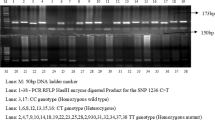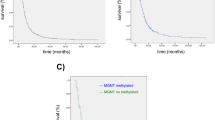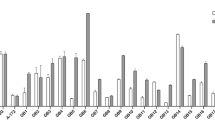Abstract
This study aims to investigate the associations of O6-methylguanine-DNA methyltransferase (MGMT) genetic polymorphisms (Leu84Phe and Ile143Val) with temozolomide (TMZ) resistance and prognosis of patients with malignant gliomas. A total of 212 patients diagnosed with malignant gliomas were enrolled in this study as the case group. All of these patients took oral TMZ and were assigned into the TMZ-sensitive (complete response+partial response) and the TMZ-resistant (stable disease+progressive disease) groups based on the clinical response after chemotherapy. The polymerase chain reaction-restriction fragment length polymorphism was used to identify the gene polymorphism of Leu84Phe and Ile143Val. The survival time and survival outcomes of all the patients were obtained by follow-up. There were significant differences in the genotype and allele of Leu84Phe between the TMZ-sensitive and the TMZ-resistant groups. The CT, TT and CT+TT genotypes and the T allele of MGMT gene Leu84Phe may be associated with increasing TMZ resistance in patients with malignant gliomas. Logistic regression analysis showed that Leu84Phe of MGMT gene and pathological grade were independent risk factors for the increase of TMZ resistance in patients with malignant gliomas. Kaplan–Meier survival curve revealed that the average survival time of patients with the CT+TT and CC genotypes of Leu84Phe in the two groups was statistically significant. COX regression analysis showed that Leu84Phe, degree of resection and pathological grade were independent prognostic factors for patients with malignant gliomas. Our study demonstrates that Leu84Phe of MGMT gene might be a risk factor of TMZ resistance and poor prognosis of patients with malignant gliomas.
This is a preview of subscription content, access via your institution
Access options
Subscribe to this journal
Receive 12 print issues and online access
$259.00 per year
only $21.58 per issue
Buy this article
- Purchase on Springer Link
- Instant access to full article PDF
Prices may be subject to local taxes which are calculated during checkout

Similar content being viewed by others
References
Lakicevic G, Splavski B, Brekalo Z . The value of stereotactic biopsy in improving survival and quality of life for malignant brain glioma patients. Coll Antropol 2010; 34 (Suppl 1): 93–97.
Li QQ, Lee RX, Liang H, Zhong Y . Anticancer activity of beta-Elemene and its synthetic analogs in human malignant brain tumor cells. Anticancer Res 2013; 33: 65–76.
Thakkar JP, Dolecek TA, Horbinski C, Ostrom QT, Lightner DD, Barnholtz-Sloan JS et al. Epidemiologic and molecular prognostic review of glioblastoma. Cancer Epidemiol Biomarkers Prev 2014; 23: 1985–1996.
Nelson JS, Burchfiel CM, Fekedulegn D, Andrew ME . Potential risk factors for incident glioblastoma multiforme: the Honolulu Heart Program and Honolulu-Asia Aging Study. J Neurooncol 2012; 109: 315–321.
Sampetrean O, Saga I, Nakanishi M, Sugihara E, Fukaya R, Onishi N et al. Invasion precedes tumor mass formation in a malignant brain tumor model of genetically modified neural stem cells. Neoplasia 2011; 13: 784–791.
Castro BA, Imber BS, Chen R, McDermott MW, Aghi MK . Ventriculoperitoneal shunting for glioblastoma: risk factors, indications, and efficacy. Neurosurgery 2016; 80: 421–430.
Riemenschneider MJ, Hegi ME, Reifenberger G . MGMT promoter methylation in malignant gliomas. Target Oncol 2010; 5: 161–165.
Wick W, Weller M, van den Bent M, Sanson M, Weiler M, von Deimling A et al. MGMT testing—the challenges for biomarker-based glioma treatment. Nat Rev Neurol 2014; 10: 372–385.
Gaspar N, Marshall L, Perryman L, Bax DA, Little SE, Viana-Pereira M et al. MGMT-independent temozolomide resistance in pediatric glioblastoma cells associated with a PI3-kinase-mediated HOX/stem cell gene signature. Cancer Res 2010; 70: 9243–9252.
Beier D, Rohrl S, Pillai DR, Schwarz S, Kunz-Schughart LA, Leukel P et al. Temozolomide preferentially depletes cancer stem cells in glioblastoma. Cancer Res 2008; 68: 5706–5715.
Zawlik I, Vaccarella S, Kita D, Mittelbronn M, Franceschi S, Ohgaki H . Promoter methylation and polymorphisms of the MGMT gene in glioblastomas: a population-based study. Neuroepidemiology 2009; 32: 21–29.
Tranah GJ, Bugni J, Giovannucci E, Ma J, Fuchs C, Hines L et al. O6-methylguanine-DNA methyltransferase Leu84Phe and Ile143Val polymorphisms and risk of colorectal cancer in the Nurses' Health Study and Physicians' Health Study (United States). Cancer Causes Control 2006; 17: 721–731.
Felini MJ, Olshan AF, Schroeder JC, North KE, Carozza SE, Kelsey KT et al. DNA repair polymorphisms XRCC1 and MGMT and risk of adult gliomas. Neuroepidemiology 2007; 29: 55–58.
Stupp R, Mason WP, van den Bent MJ, Weller M, Fisher B, Taphoorn MJ et al. Radiotherapy plus concomitant and adjuvant temozolomide for glioblastoma. N Engl J Med 2005; 352: 987–996.
Eisenhauer EA, Therasse P, Bogaerts J, Schwartz LH, Sargent D, Ford R et al. New response evaluation criteria in solid tumours: revised RECIST guideline (version 1.1). Eur J Cancer 2009; 45: 228–247.
Stetson LC, Dazard JE, Barnholtz-Sloan JS . Protein markers predict survival in glioma patients. Mol Cell Proteomics 2016; 15: 2356–2365.
Qian ZZ, Wang HQ, Liu XM, Yang SY, Fu Z, Chang Y et al. A multicenter randomized controlled study of temozolomide in 97 patients with malignant brain glioma. Zhonghua Yi Xue Za Zhi 2009; 89: 2059–2062.
Liu Y, Scheurer ME, El-Zein R, Cao Y, Do KA, Gilbert M et al. Association and interactions between DNA repair gene polymorphisms and adult glioma. Cancer Epidemiol Biomarkers Prev 2009; 18: 204–214.
Weller M, Stupp R, Reifenberger G, Brandes AA, van den Bent MJ, Wick W et al. MGMT promoter methylation in malignant gliomas: ready for personalized medicine? Nat Rev Neurol 2010; 6: 39–51.
Abhinav K, Aquilina K, Gbejuade H, La M, Hopkins K, Iyer V . A pilot study of glioblastoma multiforme in elderly patients: treatments, O-6-methylguanine-DNA methyltransferase (MGMT) methylation status and survival. Clin Neurol Neurosurg 2013; 115: 1375–1378.
Park JY, Lee SY, Jeon HS, Bae NC, Chae SC, Joo S et al. Polymorphism of the DNA repair gene XRCC1 and risk of primary lung cancer. Cancer Epidemiol Biomarkers Prev 2002; 11: 23–27.
Beier D, Schriefer B, Brawanski K, Hau P, Weis J, Schulz JB et al. Efficacy of clinically relevant temozolomide dosing schemes in glioblastoma cancer stem cell lines. J Neurooncol 2012; 109: 45–52.
Shah MA, Shaff SM, Lone GN, Jan SM . Lack of influence of MGMT codon Leu84Phe and codon Ileu143Val polymorphisms on esophageal cancer risk in the Kashmir Valley. Asian Pac J Cancer Prev 2012; 13: 3047–3052.
Pokorny JL, Calligaris D, Gupta SK, Iyekegbe DO Jr., Mueller D, Bakken KK et al. The efficacy of the Wee1 inhibitor MK-1775 combined with temozolomide is limited by heterogeneous distribution across the blood–brain barrier in glioblastoma. Clin Cancer Res 2015; 21: 1916–1924.
McDonald KL, Rapkins RW, Olivier J, Zhao L, Nozue K, Lu D et al. The T genotype of the MGMT C>T (rs16906252) enhancer single-nucleotide polymorphism (SNP) is associated with promoter methylation and longer survival in glioblastoma patients. Eur J Cancer 2013; 49: 360–368.
Du L, Wang H, Xiong T, Ma Y, Yang J, Huang J et al. The polymorphisms in the MGMT gene and the risk of cancer: a meta-analysis. Tumour Biol 2013; 34: 3227–3237.
Liu J, Zhang R, Chen F, Yu C, Sun Y, Jia C et al. MGMT Leu84Phe polymorphism contributes to cancer susceptibility: evidence from 44 case-control studies. PLoS ONE 2013; 8: e75367.
Ritchey JD, Huang WY, Chokkalingam AP, Gao YT, Deng J, Levine P et al. Genetic variants of DNA repair genes and prostate cancer: a population-based study. Cancer Epidemiol Biomarkers Prev 2005; 14: 1703–1709.
Kim M, Kang HG, Lee SY, Lee HC, Lee EB, Choi YY et al. Comprehensive analysis of DNA repair gene polymorphisms and survival in patients with early stage non-small-cell lung cancer. Cancer Sci 2010; 101: 2436–2442.
Loh YH, Mitrou PN, Bowman R, Wood A, Jeffery H, Luben RN et al. MGMT Ile143Val polymorphism, dietary factors and the risk of breast, colorectal and prostate cancer in the European Prospective Investigation into Cancer and Nutrition (EPIC)-Norfolk study. DNA Repair (Amst) 2010; 9: 421–428.
Acknowledgements
We acknowledge the helpful comments on this paper received from our reviewers.
Author information
Authors and Affiliations
Corresponding author
Ethics declarations
Competing interests
The authors declare no conflict of interest.
Rights and permissions
About this article
Cite this article
Wang, HW., Xu, ZK., Song, Y. et al. Correlations of MGMT genetic polymorphisms with temozolomide resistance and prognosis of patients with malignant gliomas: a population-based study in China. Cancer Gene Ther 24, 215–220 (2017). https://doi.org/10.1038/cgt.2017.7
Received:
Revised:
Accepted:
Published:
Issue Date:
DOI: https://doi.org/10.1038/cgt.2017.7
This article is cited by
-
FMR1NB Involved in Glioma Tumorigenesis Is a Promising Target for Prognosis and Therapy
Current Medical Science (2022)
-
Temozolomide-induced myelotoxicity and single nucleotide polymorphisms in the MGMT gene in patients with adult diffuse glioma: a single-institutional pharmacogenetic study
Journal of Neuro-Oncology (2022)



